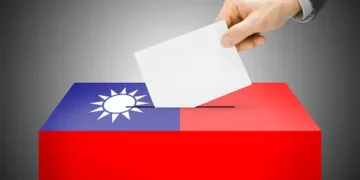TAIPEI: As Taiwan’s presidential election approaches, the prospect of China reimposing tariffs on Taiwanese imports under a cross-strait free trade agreement has taken on political significance. Analysts warn of potential long-term economic damage to Taiwan, and there is uncertainty about China’s future actions, which are expected to vary depending on the election outcome.
The three presidential candidates – Mr. Lai Ching-te of the Democratic Progressive Party (DPP), Mr. Hou Yu-ih of the Kuomintang (KMT), and Dr. Ko Wen-je of the Taiwan People’s Party (TPP) – represent different approaches to cross-strait relations and trade.
Analysts express concerns about China’s next steps in this matter and their impact on Taiwan’s economy. The latest developments stem from China’s investigation into Taiwan’s ban on more than 2,500 types of imports from the mainland, which Beijing claims violates the Economic Cooperation Framework Agreement (ECFA) and World Trade Organization (WTO) rules. As a result, China suspended tariff cuts on 12 chemical products from Taiwan and is now exploring similar actions on agriculture, fishery, machinery, auto parts, and textile imports.
While trade experts anticipate limited short-term effects, they worry that these actions could have a cascading impact on related industries and harm business confidence.
China’s timing in conducting the trade investigation raises suspicions of influencing Taiwan’s election. However, experts also acknowledge genuine economic reasons behind the investigation. China is Taiwan’s top trading partner, with cross-strait trade totaling US$224 billion in the previous year. Taiwan maintains a trade surplus with China, accounting for about 35% of Taiwan’s exports in 2023.
Taiwan’s import restrictions cover a wide range of goods, including agricultural produce, electronics, steel products, and vehicles, intended to protect domestic industries. China estimates the value of lost exports due to these restrictions, such as US$2.5 billion in fresh vegetables and US$170 million in fruits.
Experts express concerns over the long-term effects of reimposed tariffs. Some products are easily replaceable, and increased tariffs could impact the competitiveness of Taiwan’s exports, leading manufacturers to relocate to other countries. This could affect midstream and downstream industries, potentially leading to job losses in Taiwan’s petrochemical industry, affecting the rubber, plastic, and pharmaceutical sectors.
Economists also worry about harm to business confidence due to the suspension of tariff cuts, which could lead firms to consider moving out of Taiwan or increasing investments elsewhere.
The outcome of the presidential election will play a crucial role in shaping future cross-strait trade relations and resolving this ongoing dispute.
Discover in-depth supply chain report news insights at The Supply Chain Report. For international trade tools, see ADAMftd.com.
#TaiwanElections #ChinaTrade #CrossStraitRelations #DPP #KMT #TPP #ECFA #WTO #Tariffs #EconomicImpact #TradeRelations #BusinessConfidence #ExportSurplus #TaiwanEconomy #PoliticalSignificance #AgriculturalImports #IndustryImpact #ManufacturingTrends















